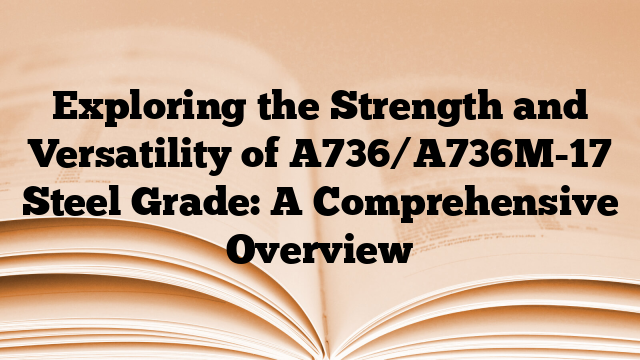The A736/A736M-17 steel grade is a low-carbon, high-strength, and high-impact toughness steel that is commonly used for the construction of pressure vessels and other structural applications. This steel grade is known for its excellent strength and versatility, making it a popular choice in various industries where high performance and reliability are required.
The chemical composition of A736/A736M-17 steel grade is carefully controlled to ensure its exceptional strength and toughness. It primarily consists of iron, carbon, manganese, phosphorus, sulfur, silicon, nickel, chromium, and molybdenum. The carbon content is typically limited to a maximum of 0.35% to maintain its low-carbon characteristics, while manganese is added for improved strength and hardenability. The addition of trace elements such as phosphorus, sulfur, silicon, nickel, chromium, and molybdenum further enhances the mechanical properties of the steel.
The mechanical properties of A736/A736M-17 steel grade are a result of its unique chemical composition and carefully controlled manufacturing process. The steel exhibits excellent tensile strength, yield strength, and impact toughness. It has a minimum tensile strength of 550 MPa (80 ksi) and a minimum yield strength of 485 MPa (70 ksi). The impact toughness is also exceptional, with minimum Charpy V-notch (CVN) values of 27 J (20 ft-lbf) at -50°C (-58°F). These properties make it suitable for applications that require high strength, toughness, and resistance to fracture.
A736/A736M-17 steel grade is produced according to the ASTM A736/A736M standard, which provides specifications for quenched and tempered low-alloy steel plates for pressure vessels. This standard ensures that the steel meets specific requirements regarding chemical composition, mechanical properties, heat treatment, and dimensional tolerances.
In conclusion, the A736/A736M-17 steel grade is a superior option for applications that require high strength and toughness. Its controlled chemical composition and stringent manufacturing process result in exceptional mechanical properties and reliability. Its versatility makes it suitable for various industries, including oil and gas, chemical, power generation, and transportation.

